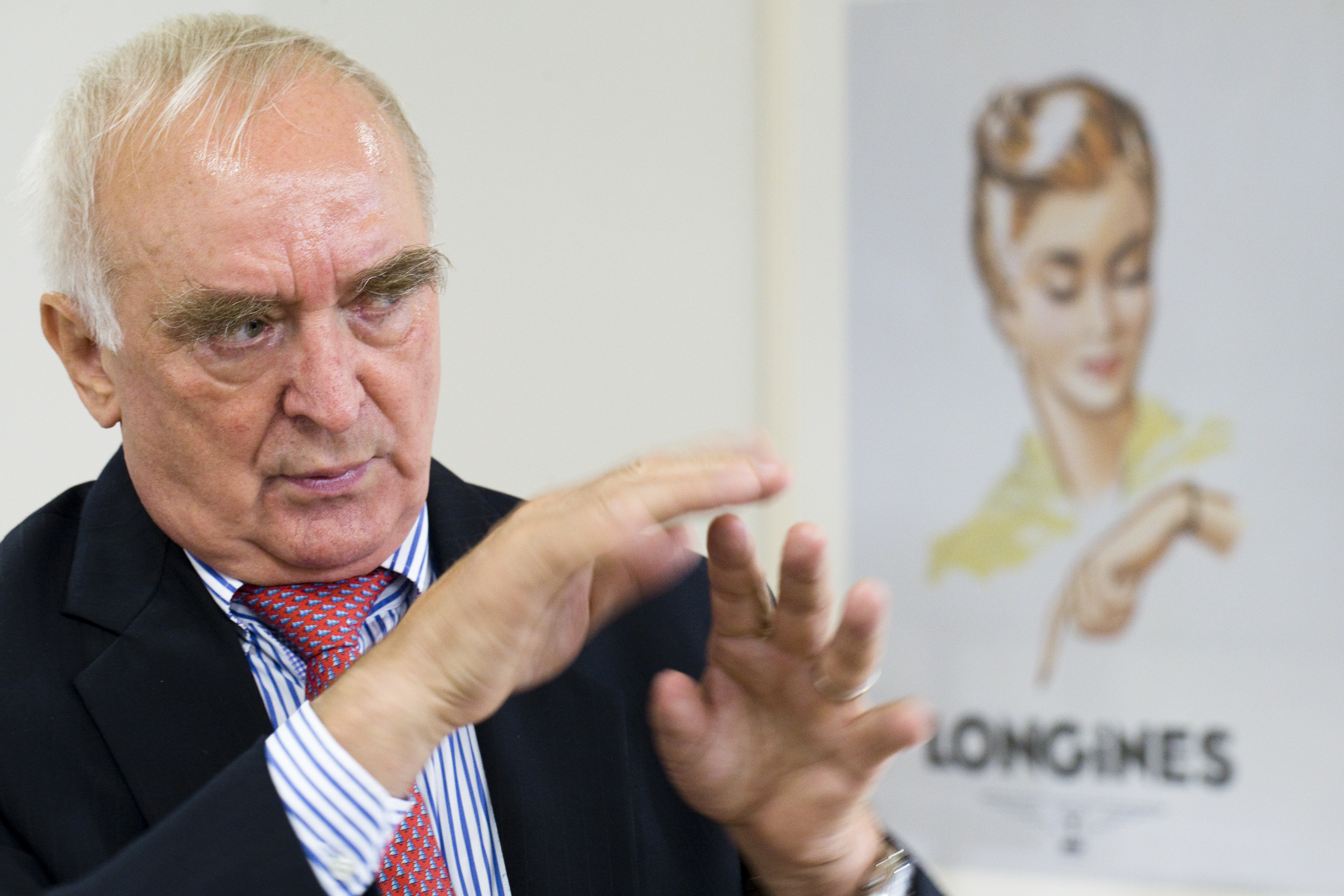Longines oldtimers show newcomers how it’s done

From his spacious office in Saint-Imier, a town of 5,000 tucked away in the heart of the Jura, Walter von Kaenel, the 72-year-old head of Longines, reveals the secrets of his success to swissinfo.ch.
“In life, you either get a kick up the butt or you dish them out,” says the one-time infantry colonel responsible for dragging the 180-year-old watch brand into the 21st century with annual sales topping one billion francs last year.
The effervescent, if somewhat gruff, von Kaenel has been head of Longines for 25 years and still refuses to use a computer or the internet, growling: “I don’t give a damn about that stuff”.
He thus proceeds to enthusiastically show off the charts and graphics contained in the stacks of files that fill the office and attest to the meteoric rise of the emblematic brand over the last decade.
And the man is as frank as he is cunning. Having presented his detailed, if astounding set of figures, he insists that swissinfo.ch not reveal their content because only Longines’ parent company, Swatch Group, is authorised to reveal the full results of its brands. In 2012, Swatch Group booked turnover of CHF8.1 billion ($8.67 billion).

More
Watch industry looks to consolidate good fortune
World leader
Von Kaenel has no illusions about the reasons behind the rapid growth of Longines.
“Like the rest of the luxury industry, watch making has benefited from an extremely splendid period over the last decade,” he says. “In this business, it is the big groups which dominate. Thanks to the production capacity for movements and the immense distribution network of the Swatch Group coupled with our strong presence in the Far East, we have been able to record extraordinary growth and resist the crisis of 2008-2009 quite well.”
Longines is now the world leader in the category of watches priced between CHF800 and CHF4,000 and is the fourth-placed Swiss brand – behind Rolex, Omega and Cartier – when all the categories are combined.
“Contrary to the newcomers, who are primarily present in jewellery, fashion or accessories, we have stuck to our core trade and emphasised a line of classic watches. And we have always resisted the temptation to hike the prices,” von Kaenel says.
Longines is one of those Swiss watch brands that has not been afraid of exploiting its history of “tradition and authenticity”, particularly in the key luxury market of China.
“We have been present there since 1867! I myself, since 1972, have been there more than 300 times,” remarks von Kaenel.
Walter von Kaenel was born in 1941 in Schwerin, Germany, after his grandfather left Switzerland with his children in 1929.
Following the Second World War, he was repatriated to Renan, a village in the Saint-Imier valley where his parents grew up.
After completing a sales apprenticeship, he worked with the federal customs administration before joining makers of watch faces Jean Singer & Cie in La Chaux-de-Fonds.
In 1969 he joined the sales department at Longines. He was nominated director of sales in 1977 and managing director in 1988.
He was also heavily involved in local politics as a member of the Radicals. He was a member of the Inter-Jura Assembly and a member of the government for French-speaking Bern.
Von Kaenel had a long career in the military, reaching the rank of colonel in 1988.
(Source: Jura Dictionary)
Rosy future
Still an emerging market, China is a battleground for watchmakers, and in particular for Longines, which has more than 400 points of sale there.
“Having conquered the mega-cities, we are now moving into those with five or ten million people. We are spending millions on geographic expansion and on defending our share of the market. I can assure you that we don’t make life easy for the newcomers!” says von Kaenel.
But the economic slowdown in China and a crackdown on corruption – which has been symbolised in the press by the sight of luxury watches on the wrists of Chinese officials – have put the brakes on watch exports in recent months (-33.6% in continental China, -24.4% for Hong Kong in February).
“Whatever some people might say, Longines has not been affected by the measures taken by the Chinese government aimed at limiting gifts of luxury products to public servants,” insists von Kaenel, who scrupulously reads the daily reports from China. “Our excellent sales in the first quarter of this year confirm that.”
As for counterfeits; “they are the by-product of success”, he says.
“The fight against counterfeiting costs a lot of money but the sector is defending itself quite well. And China has been cooperating better since it joined the World Trade Organization [in 2001].”

More
Keeping old watches ticking over
Pitfalls of emerging markets
From the banks of the river Suze, which flows from the bottom of the Saint-Imier valley, 800 people work at the historic Longines factory – including 300 French who cross the border each day. It is here that von Kaenel and his powerful marketing department keep an eye on global markets.
“The Emirates, it’s a paradise at the moment, thanks mostly to the Chinese tourists who go there for the shopping,” he says. “The other Arab markets are suffering a bit from the aftershocks of the Arab Spring. We are in an excellent position in countries in the East. In North America, we avoided the crisis of 2009 by drastically reducing our distribution network.”
The least promising market in terms of growth potential is South America, reveals the Longines boss.
“We have not put a foot in Brazil because the practice of public servants does not conform to our policy,” he says, referring to corruption issues in the country. “I hope that the football World Cup and the Olympic Games will bring about a change in the situation.”
The watch-making industry is Switzerland’s third largest export industry after the chemicals and heavy machinery sectors. Its companies are mostly located in cantons Neuchâtel, Bern, Geneva, Solothurn, Jura and Vaud.
The sector reached its peak production at the end of the 1960s with more than 90,000 people working for 1,500 companies.
In the early 1970s, competition from Asia, makers of quartz watches, changed the face of the market and plunged the Swiss watchmaking industry into a profound crisis.
By the middle of the 1980s, the sector counted just 500-600 businesses employing 30,000 people.
Turning to production of watches for mass markets, in particular Swatch Watches, Swiss watchmakers reinvented themselves and revived the industry. The sector has thrived in the last decade thanks to massive interest in luxury watches.
Today, the industry employs some 50,000 people. In 2012, watch exports grew 11% on-year to CHF21,418 billion.
(Translated from French by Sophie Douez)

In compliance with the JTI standards
More: SWI swissinfo.ch certified by the Journalism Trust Initiative









You can find an overview of ongoing debates with our journalists here . Please join us!
If you want to start a conversation about a topic raised in this article or want to report factual errors, email us at english@swissinfo.ch.